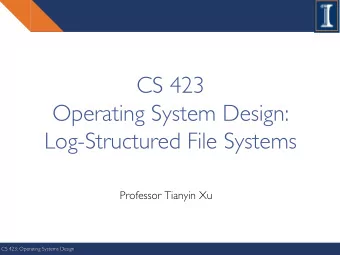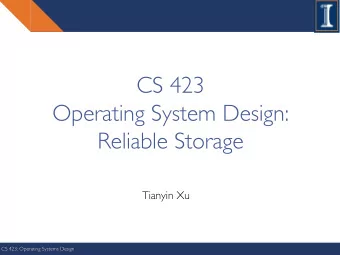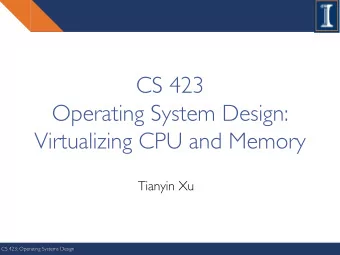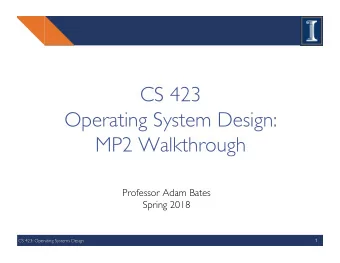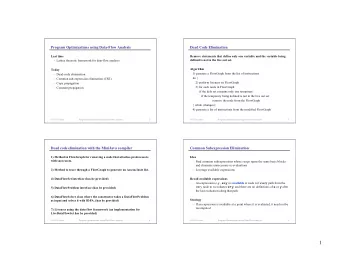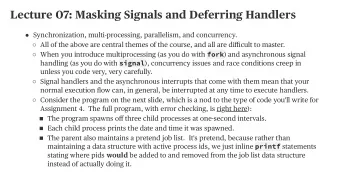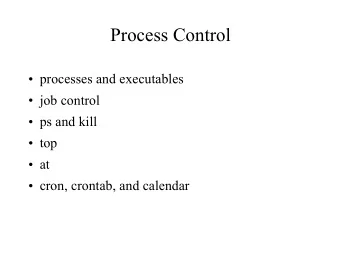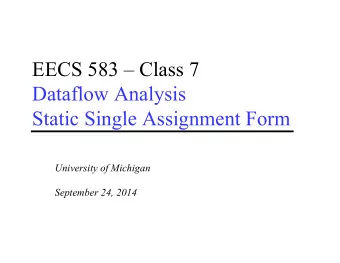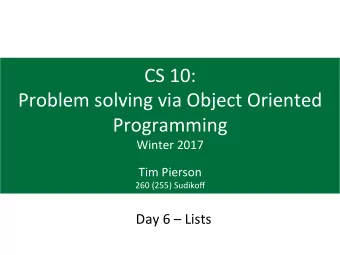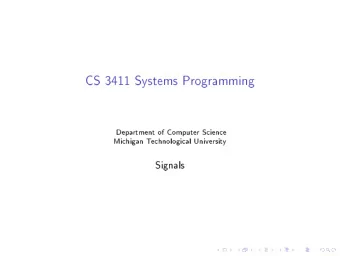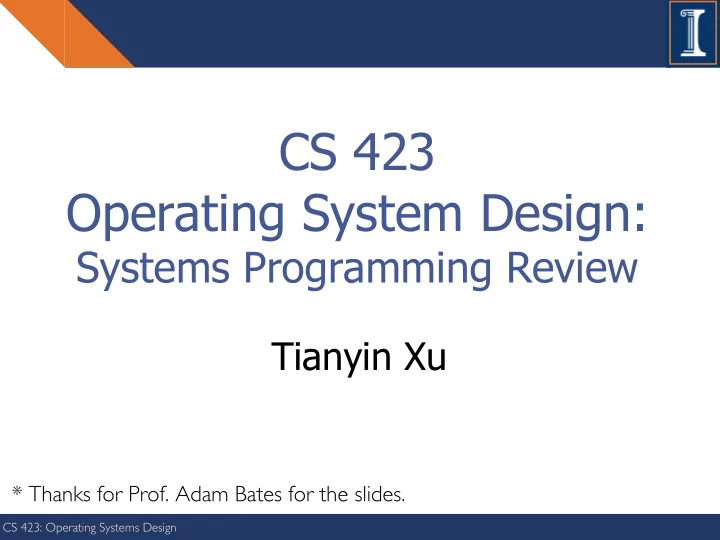
CS 423 Operating System Design: Systems Programming Review Tianyin - PowerPoint PPT Presentation
CS 423 Operating System Design: Systems Programming Review Tianyin Xu * Thanks for Prof. Adam Bates for the slides. CS 423: Operating Systems Design MP-0 is out MP-0 is out. C4 Readings are out. If you are enrolled, you should have
CS 423 Operating System Design: Systems Programming Review Tianyin Xu * Thanks for Prof. Adam Bates for the slides. CS 423: Operating Systems Design
MP-0 is out • MP-0 is out. • C4 Readings are out. • If you are enrolled, you should have a VM. • If you haven’t enrolled, you will have a VM after enrollment. • We will make sure you have enough time to finish MP-0 if you have a late VM. CS 423: Operating Systems Design 2
Creating a Process - fork() • What UNIX call creates a process? • fork() duplicates a process so that instead of one process you get two. ■ The new process and the old process both continue in parallel from the statement that follows the fork() CS 423: Operating Systems Design 3
System Calls Function Calls System Calls ? Caller and callee are in the same Process - Same user - Same “domain of trust” CS 423: Operating Systems Design 4
Review: System Calls Function Calls System Calls Caller and callee are in the same Process - OS is trusted; user is not. - Same user - OS has super-privileges; user does not - Same “domain of trust” - Must take measures to prevent abuse CS 423: Operating Systems Design 5
Example System Calls? CS 423: Operating Systems Design 6
Example System Calls? Example: getuid() //get the user ID fork() //create a child process exec() //executing a program Don’t confuse system calls with stdlib calls Differences? Is printf() a system call? Is rand() a system call? CS 423: Operating Systems Design 7
Example System Calls? Example: getuid() //get the user ID fork() //create a child process exec() //executing a program Don’t confuse system calls with stdlib calls Differences? Is printf() a system call? Is rand() a system call? CS 423: Operating Systems Design 8
Syscalls vs. I/O Lib Calls Each system call has analogous procedure calls from the standard I/O library: System Call Standard I/O call open fopen close fclose read/write getchar/putchar getc/putc fgetc/fputc fread/fwrite gets/puts fgets/fputs scanf/printf fscanf/fprintf lseek fseek CS 423: Operating Systems Design 9
Processes ■ Possible process states ■ Running (occupy CPU) ■ Blocked ■ Ready (does not occupy CPU) ■ Other states: suspended, terminated Question: in a single processor machine, how many process can be in running state? CS 423: Operating Systems Design 10
Processes ■ Possible process states ■ Running (occupy CPU) ■ Blocked ■ Ready (does not occupy CPU) ■ Other states: suspended, terminated Question: in a single processor machine, how many process can be in running state? CS 423: Operating Systems Design 11
Creating a Process • What UNIX call creates a process? CS 423: Operating Systems Design 12
Creating a Process - fork() • What UNIX call creates a process? • fork() duplicates a process so that instead of one process you get two. ■ The new process and the old process both continue in parallel from the statement that follows the fork() CS 423: Operating Systems Design 13
Creating a Process - fork() • What UNIX call creates a process? • fork() duplicates a process so that instead of one process you get two. ■ The new process and the old process both continue in parallel from the statement that follows the fork() • How can you tell the two processes apart? CS 423: Operating Systems Design 14
Creating a Process - fork() • What UNIX call creates a process? • fork() duplicates a process so that instead of one process you get two. ■ The new process and the old process both continue in parallel from the statement that follows the fork() • How can you tell the two processes apart? • fork() returns ■ 0 to child ■ -1 if fork fails ■ Child’s PID to parent process CS 423: Operating Systems Design 15
Creating a Process - fork() • What UNIX call creates a process? • fork() duplicates a process so that instead of one process you get two. ■ The new process and the old process both continue in parallel from the statement that follows the fork() • How can you tell the two processes apart? • fork() returns ■ 0 to child ■ -1 if fork fails ■ Child’s PID to parent process ■ If the parent code changes a global variable, will the child see the change? CS 423: Operating Systems Design 16
Creating a Process - fork() • What UNIX call creates a process? • fork() duplicates a process so that instead of one process you get two. ■ The new process and the old process both continue in parallel from the statement that follows the fork() • How can you tell the two processes apart? • fork() returns ■ 0 to child ■ -1 if fork fails ■ Child’s PID to parent process ■ If the parent code changes a global variable, will the child see the change? ■ Nope! On fork, child gets new program counter, stack, file descriptors, heap, globals, pid! CS 423: Operating Systems Design 17
Creating a Process • What if we need the child process to execute different code than the parent process? CS 423: Operating Systems Design 18
Creating a Process - exec() • What if we need the child process to execute different code than the parent process? ■ Exec function allows child process to execute code that is different from that of parent ■ Exec family of functions provides a facility for overlaying the process image of the calling process with a new image. ■ Exec functions return -1 and sets errno if unsuccessful CS 423: Operating Systems Design 19
Threads vs. Processes • What is the difference between a thread and a process? CS 423: Operating Systems Design 20
Threads vs. Processes • What is the difference between a thread and a process? ■ Both provided independent execution sequences, but… ■ Each process has its own memory space ■ Remember how child processes can’t see changes to parent’s global variable?? ■ Threads run in a shared memory space CS 423: Operating Systems Design 21
Threads vs. Processes • What is POSIX? • How do you create a POSIX thread? CS 423: Operating Systems Design 22
Threads vs. Processes • What is POSIX? • How do you create a POSIX thread? POSIX function description pthread_create create a thread pthread_detach set thread to release resources pthread_equal test two thread IDs for equality pthread_exit exit a thread without exiting process pthread_kill send a signal to a thread pthread_join wait for a thread pthread_self find out own thread ID CS 423: Operating Systems Design 23
Threads: Lightweight Proc’s execution execution Environment (resource) Environment (resource) ■ (a) Three processes each with one thread ■ (b) One process with three threads 24 24 CS 423: Operating Systems Design
Threads: Kernel v. User ■ What is the difference between kernel and user threads? Pros and Cons? CS 423: Operating Systems Design 25
Threads: Kernel v. User ■ What is the difference between kernel and user threads? Pros and Cons? ■ Kernel thread packages ■ Each thread can make blocking I/O calls ■ Can run concurrently on multiple processors ■ Threads in User-level ■ Fast context switch ■ Customized scheduling CS 423: Operating Systems Design 26
Hybrid Threads (Solaris) M:N model multiplexes N user-level threads onto M kernel-level threads Good idea? Bad Idea? 27 CS 423: Operating Systems Design
Synchronization ■ Processes and threads can be preempted at arbitrary times, which may generate problems. ■ Example: What is the execution outcome of the following two threads (initially x=0)? Thread 1: Thread 2: Read X Read X Add 1 Add 1 Write X Write X How do we account for this? CS 423: Operating Systems Design 28
Critical Regions/Sections Process { while (true) { ENTER CRITICAL SECTION Access shared variables; LEAVE CRITICAL SECTION Do other work } } CS 423: Operating Systems Design 29
Mutex ■ Simplest and most efficient thread synchronization mechanism ■ A special variable that can be either in ■ locked state: a distinguished thread that holds or owns the mutex; or ■ unlocked state: no thread holds the mutex ■ When several threads compete for a mutex, the losers block at that call ■ The mutex also has a queue of threads that are waiting to hold the mutex. ■ POSIX does not require that this queue be accessed FIFO. ■ Helpful note — Mutex is short for “Mutual Exclusion” CS 423: Operating Systems Design 30
POSIX Mutex Functions ■ int pthread_mutex_init (pthread_mutex_t *restrict mutex, const pthread_mutexattr_t *restrict attr); Also see PTHREAD_MUTEX_INITIALIZER ■ ■ int pthread_mutex_destroy (pthread_mutex_t *mutex); ■ int pthread_mutex_lock (pthread_mutex_t *mutex); ■ int pthread_mutex_trylock (pthread_mutex_t *mutex); ■ int pthread_mutex_unlock (pthread_mutex_t *mutex); CS 423: Operating Systems Design 31
Semaphores Pseudocode for a blocking implementation of semaphores: void wait (semaphore_t *sp) if (sp->value >0) sp->value--; else { <Add this process to sp->list> <block> } void signal (semaphore_t *sp) if (sp->list != NULL) <remove a process from sp->list, put it in ready state> else sp->value++; CS 423: Operating Systems Design 32
Scheduling ■ Basic scheduling algorithms FIFO (FCFS) ■ Shortest job first ■ Round Robin ■ Priority Scheduling ■ CS 423: Operating Systems Design 33
Recommend
More recommend
Explore More Topics
Stay informed with curated content and fresh updates.
